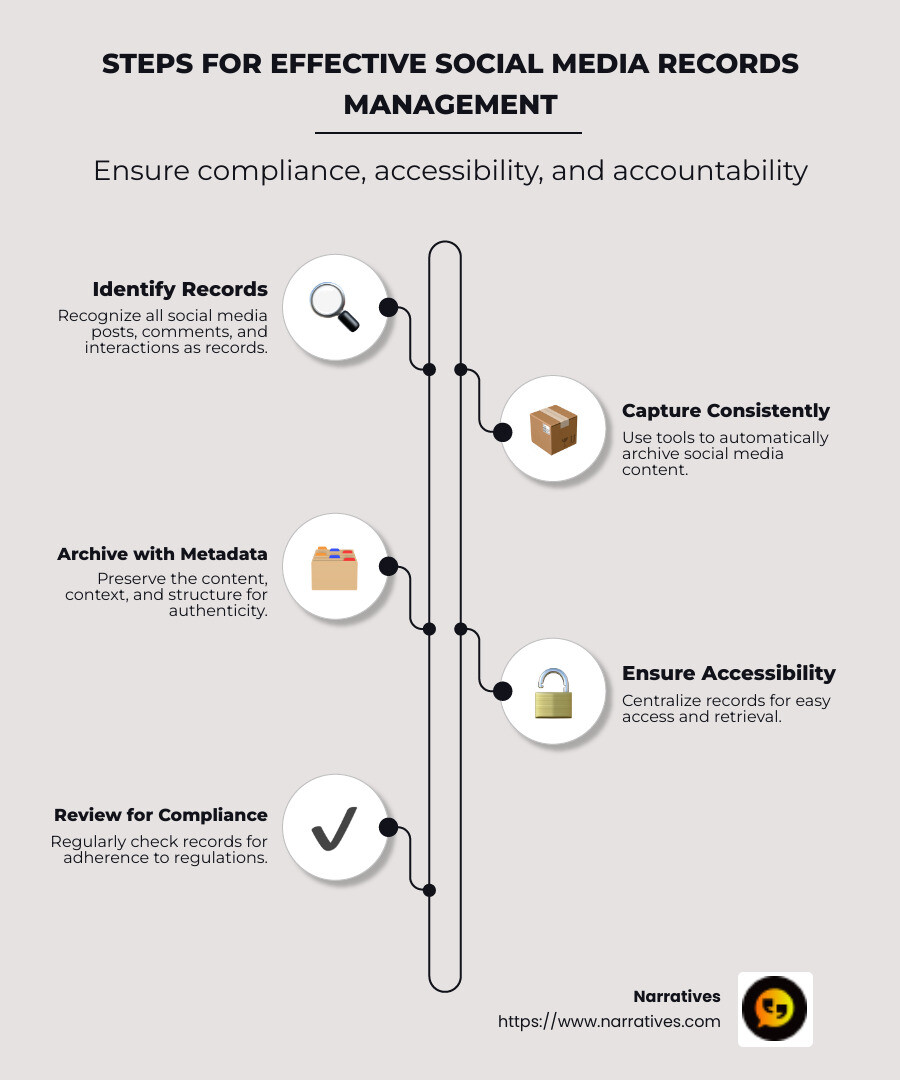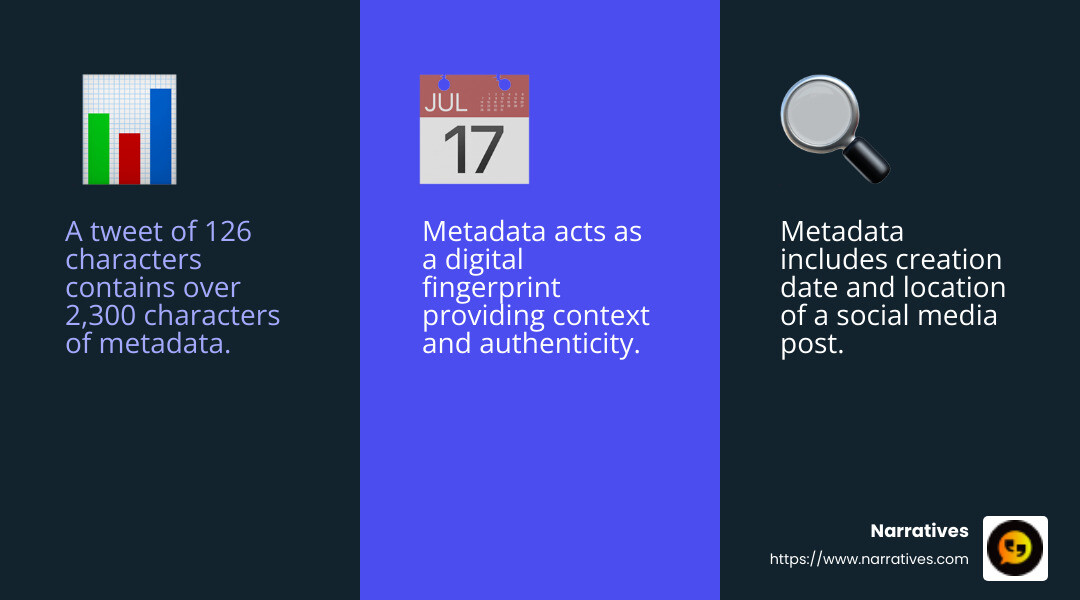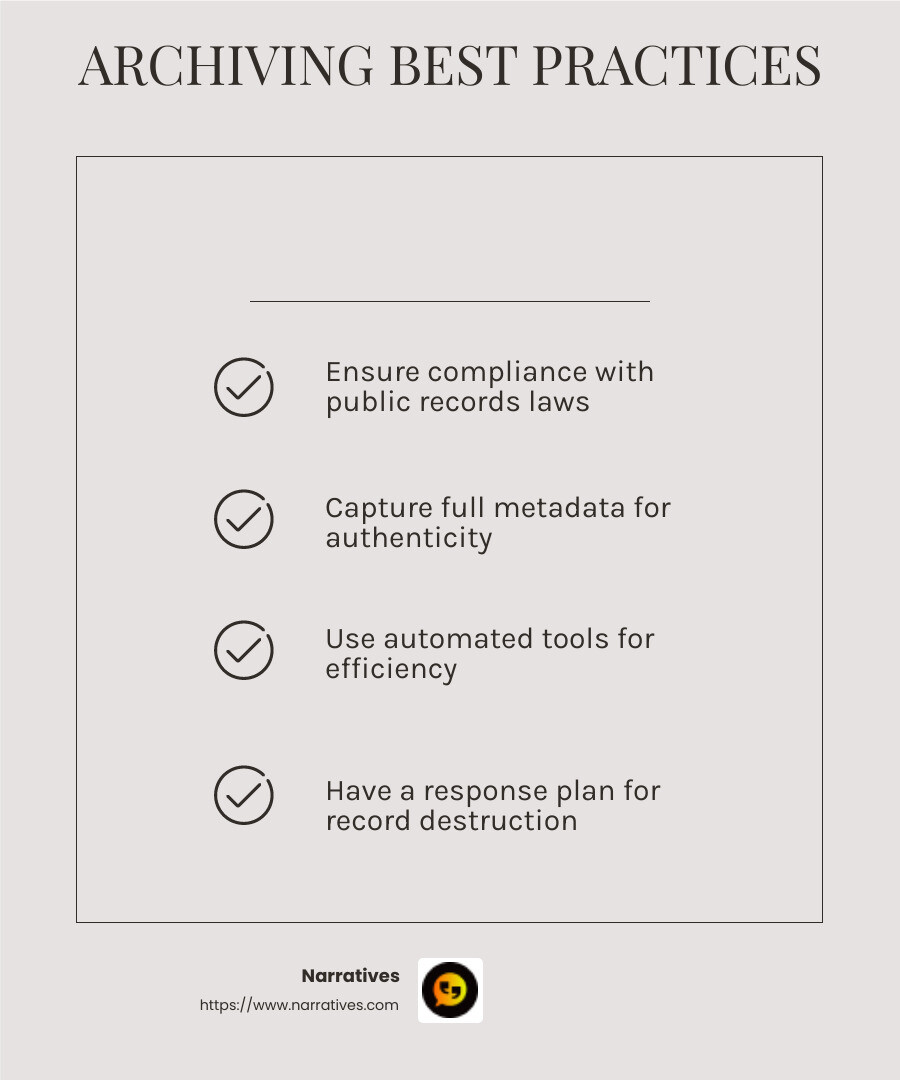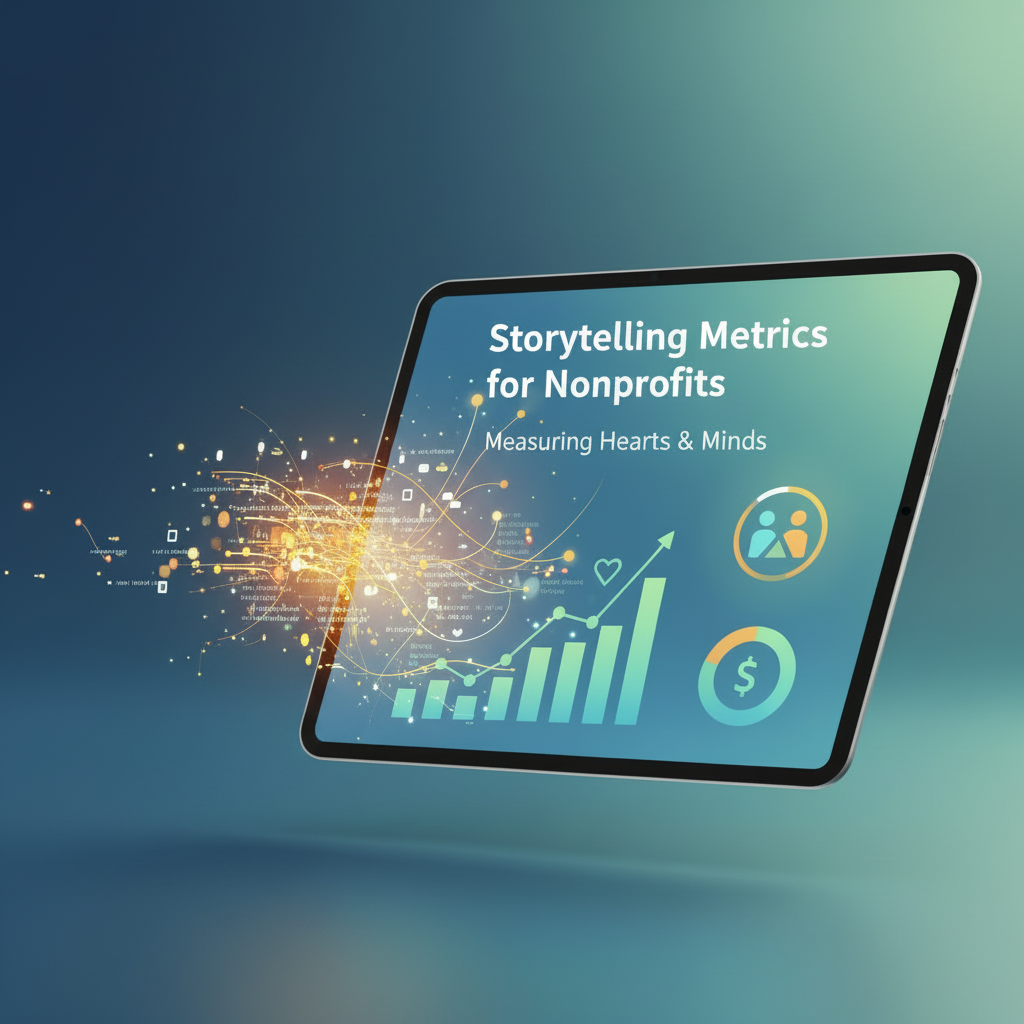Social Media Records Management: Best Practices and Tips

Social media records management is crucial for organizations navigating today's digital landscape. With social media's ever-expanding role in communication, managing these records effectively ensures compliance, accountability, and accessibility. Here's a quick overview to set the stage:
Understand the Fundamentals: Social media records include posts, comments, metadata, and interactions. These are considered public records under state laws and must be preserved.
Compliance Matters: Organizations must adhere to public record laws, FOIA requests, and data protection regulations like GDPR and CCPA.
Capture Strategies: Implement tools and technologies to automatically archive social media content for long-term retention.
Guaranteeing Authenticity: Capturing the complete record—content, context, and structure—ensures reliability.
Social media platforms can generate an overwhelming amount of information, often dispersed across various accounts and devices. This underscores the need for a robust management approach. Inefficient handling of these records not only risks non-compliance but also hampers mission-driven storytelling, which is vital for non-profits and social impact organizations.
Digitizing and centralizing records management isn't just a good idea; it's essential for satisfying stakeholder needs and legal requirements.
The stakes are high, but with strategic management practices, you can ensure that your social media efforts contribute positively to your organizational goals without getting tangled in compliance issues.

Explore more about social media records management:
Understanding Social Media Records
Social media records management is a critical aspect for organizations, especially when dealing with Federal records. But what exactly are social media records, and why are they important?
What Are Social Media Records?
Social media records are any content created or shared on social platforms—think posts, comments, photos, and videos. This content is often user-generated, meaning it comes directly from individuals interacting with your organization online.
But there's more than just the visible content. Metadata plays a crucial role in defining a social media record. Metadata is the "data about data"—it includes details like the author, creation date, and location of a post. Think of it as the digital fingerprint that provides context and authenticity to the records.

Federal Records and Social Media
Social media can create Federal records if the content has value for documenting policies or actions. For example, if a government agency uses social media to convey official information or if the content provides evidence of business activities, it's likely a Federal record.
"Does it contain evidence of NIH's policies, business, or mission?" If yes, then it's a Federal record.
The National Archives and Records Administration (NARA) offers guidance on identifying and handling these records. Managing these records involves ensuring they are complete, with all associated metadata, to maintain their reliability and authenticity.
The Importance of Metadata
Why is metadata so crucial? It ensures the record's functionality and authenticity. For instance, a Facebook post with a link should be captured with the link intact. Similarly, a tweet with an attached photo loses its meaning without the image.
Metadata also helps in searchability and retrieval, making it easier to find and use records when needed. This is especially important for compliance with public records laws and regulations like GDPR and CCPA.
In summary, understanding and managing social media records involves more than just capturing text and images. It's about preserving the full context, ensuring legal compliance, and maintaining the integrity of the records. Let's explore best practices to effectively manage these records.
Best Practices for Social Media Records Management
Successfully managing social media records involves a few key practices. Let's break them down into compliance, disaster recovery, and retention schedules.
Compliance
Compliance is not just a checkbox. It's a legal necessity. Public entities must adhere to public records laws, which means being ready for FOIA or Open Records requests at any time. Each state has laws that make social media a public record, and failure to comply can lead to hefty fines or legal trouble.
To stay compliant, organizations must preserve every post, comment, and interaction, complete with metadata. This ensures that the records are authentic and can be reproduced exactly as they appeared originally.
Disaster Recovery
Imagine losing all your social media records in a data breach or system failure. That's where disaster recovery comes in. A robust disaster recovery plan ensures that your records are safe and can be restored quickly.
Digitizing records and storing them in secure, cloud-based systems is crucial. This prevents loss due to physical damage or theft. It also makes recovery faster and more reliable, ensuring continuous access to critical records.
Retention Schedules
Retention schedules dictate how long records should be kept. Keeping records longer than necessary can be as risky as not keeping them long enough.
Organizations should define clear retention schedules based on state and federal guidelines. This involves categorizing records by type and importance, then setting appropriate timelines for retention and destruction.
For example, a tweet may need to be kept for a shorter period than a policy announcement. Having a clear schedule helps in efficient records management and compliance.
By implementing these best practices, organizations can ensure their social media records are managed effectively, reducing risks and maintaining compliance. Let's explore the tools and technologies that can aid in this process.
Tools and Technologies for Managing Social Media Records
Managing social media records efficiently is no small feat, especially with the constant influx of new content. Fortunately, there are tools and technologies designed to help organizations steer this complex landscape. Let's explore some of these solutions.
Narratives' Solutions
Narratives offers custom solutions for social media records management. These solutions are designed to help organizations, especially non-profits, efficiently archive and retrieve social media content. By focusing on user-generated content and metadata, Narratives ensures that all records are complete, authentic, and easily accessible.
Narratives' approach is to humanize the archiving process, making it more intuitive and aligned with the organization's storytelling goals. This not only helps in compliance but also improves the organization's ability to connect with its audience.
Custom Archiving Tools
Custom archiving tools are essential for organizations with specific needs. Unlike generic solutions, custom tools can be custom to capture exactly what an organization requires, whether it's tweets, Facebook posts, or Instagram stories.
These tools often come with features like automated archiving, real-time data capture, and customizable retention schedules. They also allow for integration with existing systems, making the transition seamless and efficient.
For instance, some tools can automatically convert screen captures into PDF/A format, ensuring that records are preserved in an archival-friendly manner. This is particularly useful for organizations that need to maintain the integrity of their records over time.
Integrated Platforms
Integrated platforms bring together various aspects of social media records management into a single, cohesive system. These platforms often include features like compliance monitoring, disaster recovery, and analytics.
By using an integrated platform, organizations can streamline their records management processes, reducing the risk of errors and ensuring that all records are accounted for. This is particularly important for compliance, as it ensures that records can be easily retrieved in response to FOIA or Open Records requests.
Moreover, integrated platforms often come with advanced security features, protecting records from unauthorized access and potential data breaches. This adds an extra layer of protection, ensuring that sensitive information remains secure.
In summary, the right tools and technologies can make a significant difference in how organizations manage their social media records. Whether it's through Narratives' custom solutions, specialized archiving tools, or comprehensive integrated platforms, these technologies provide the support needed to stay compliant and efficient.
Next, we'll dig into the challenges organizations face in managing social media records and how to overcome them.
Challenges in Social Media Records Management
Navigating social media records management comes with its own set of challenges. As organizations strive to keep up with the digital landscape, they encounter issues like information overload, rapidly evolving technologies, and strict compliance requirements.
Information Explosion
The sheer volume of content generated on social media platforms is staggering. Every tweet, post, and comment adds to the mountain of data that organizations need to manage. This explosion of information can be overwhelming and makes it difficult to ensure that all records are captured and stored efficiently.
For example, a single tweet of 126 characters can contain over 2,300 characters of metadata. This metadata is crucial for providing context and authenticity to the record, but it also adds to the complexity of managing social media records.
New Technologies
New technologies continuously reshape the way social media records are managed. While these advancements offer improved tools and methods, they also introduce new challenges. For instance, cloud-based file-sharing services like Box and Dropbox have simplified content sharing but raised privacy and compliance concerns.
Organizations must stay updated with the latest tools and technologies to ensure efficient social media records management. However, adopting new technologies can be daunting, especially when it involves integrating them with existing systems and processes.
Compliance
Compliance is a critical aspect of managing social media records. Public entities are required to retain all records of social media communications and interactions to comply with public records laws. Failing to do so can result in legal repercussions and damage to an organization's reputation.
Each state has specific laws regarding public records, and social media is considered a public record in every state. This means organizations must preserve posts, metadata, comments, and original content exactly as they appeared. Compliance also involves being prepared to respond to FOIA or Open Records requests, which requires efficient archiving and retrieval systems.
In summary, managing social media records is a complex task that requires organizations to steer an information-saturated environment, adapt to new technologies, and adhere to strict compliance requirements. We'll address some frequently asked questions about social media records management to further clarify this intricate process.
Frequently Asked Questions about Social Media Records Management
What qualifies as a Federal record?
Determining what counts as a Federal record can seem tricky, but it's all about context and purpose. According to the National Archives and Records Administration (NARA), a social media post qualifies as a Federal record if it:
- Contains evidence of an agency’s policies, business, or mission.
- Is the sole source of specific information.
- Conveys official agency information.
- Fulfills a business need.
For example, if a National Institutes of Health (NIH) tweet announces a new health policy, it likely qualifies as a Federal record. It's not just about the content; the metadata, such as the author and date, also plays a crucial role in establishing the record's authenticity and context.
How should social media records be archived?
Archiving social media records is essential for compliance and organizational memory. Several solutions exist, ranging from manual methods to automated tools:
Manual Capture: This method involves copying and pasting posts or taking screenshots. While straightforward, it can miss key metadata, making it less reliable.
Automated Archiving Tools: Many organizations use specialized tools to capture content and metadata efficiently, ensuring compliance with public records laws.
Narratives' Archiving Services: Narratives offers custom solutions to manage and archive social media content effectively. Our services integrate seamlessly with existing platforms, capturing every post, comment, and associated metadata for comprehensive record management.

Who should be contacted if records are destroyed prematurely?
If social media records are accidentally or intentionally destroyed, it’s crucial to act quickly to mitigate potential compliance issues. The first step is to contact the National Archives and Records Administration (NARA). They provide guidance on handling such situations and can advise on potential recovery options.
Compliance is not just about maintaining records but also about having protocols in place for when things go wrong. Ensuring that your organization has a clear response plan for premature record destruction is vital for maintaining trust and transparency.
In summary, managing social media records involves understanding what qualifies as a record, employing effective archiving solutions, and knowing who to contact when things go awry. As we continue exploring social media records management, understanding these FAQs will help you steer the complexities with confidence.
Conclusion
Social media records management is not just a technical requirement; it's an opportunity for non-profits to tell their stories with authenticity and accountability. At Narratives, we believe that every post, comment, and interaction is a chance to connect with audiences on a deeper level. By managing these records effectively, non-profits can maintain transparency and build trust with their supporters.
Our focus is on elevating underrepresented voices through digital storytelling. We help non-profits share their impact stories in ways that inspire action and foster community engagement. By using high-quality multimedia content, we ensure that the stories of the communities you serve are not only heard but also remembered.
Archiving social media records is a crucial part of this process. It allows non-profits to preserve their digital footprint, ensuring that their contributions to social change are recognized and valued. With Narratives' custom archiving solutions, you can manage your social media content seamlessly, capturing every detail for compliance and storytelling purposes.
In the rapidly evolving world of digital media, having a reliable partner like Narratives can make all the difference. Our expertise in digital storytelling and social media records management empowers non-profits to focus on what they do best: making a positive impact.
Explore how we can help you tell your story and manage your records with ease. Learn more about our media network services and find how Narratives can support your mission today.


